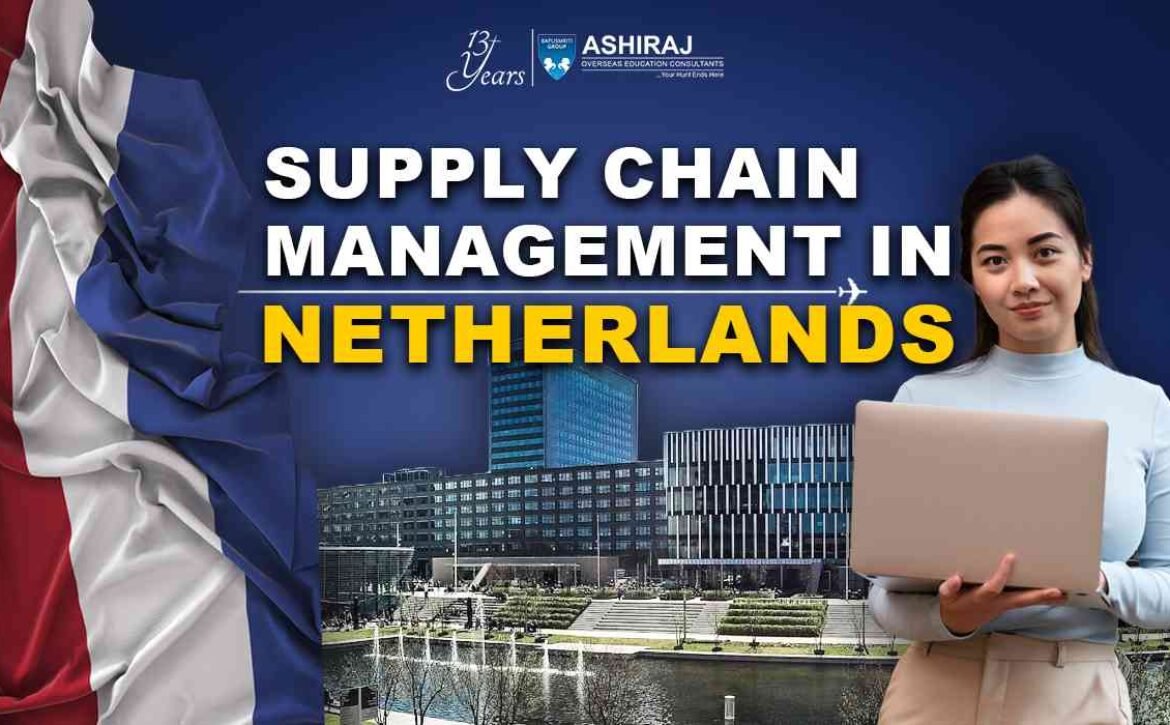
Supply Chain Management in Netherland
Supply chain management in the Netherlands encompasses a dynamic network of processes aimed at efficiently orchestrating the flow of goods, services, and information from suppliers to end customers within the Dutch business landscape. Renowned for its strategic geographical location, advanced infrastructure, and a robust logistics sector, the Netherlands serves as a pivotal hub for global trade and commerce. From its bustling seaports like Rotterdam, one of the largest in the world, to its extensive rail and road networks, the country boasts an intricate system optimized for seamless supply chain operations.
The Netherlands’ commitment to innovation and sustainability further enhances its appeal as a leading destination for supply chain management. With a focus on technological advancements such as blockchain, IoT, and automation, businesses in the Netherlands continually strive to enhance efficiency, transparency, and environmental sustainability throughout the supply chain lifecycle. As global markets evolve and demand for streamlined logistics grows, the Netherlands remains at the forefront of supply chain excellence, offering a conducive environment for businesses to thrive in an increasingly interconnected world. Supply chain management in the Netherlands stands as a testament to the nation’s prowess in fostering efficient, resilient, and sustainable supply chain ecosystems.
Why Study Supply Chain Management in the Netherlands?
- Global Hub: The Netherlands serves as a crucial global logistics hub, offering exposure to diverse supply chain environments and international business practices.
- Innovative Technologies: Dutch institutions integrate cutting-edge technologies like blockchain and IoT into supply chain education, providing hands-on experience with tools shaping the future of logistics.
- Industry Connections: Proximity to major ports and logistics companies facilitates valuable industry partnerships, internships, and networking opportunities for students.
- Strategic Location: Positioned at the heart of Europe, studying SCM in the Netherlands grants access to a vast market and enables understanding of cross-border logistics intricacies.
- Sustainable Practices: The Netherlands prioritizes sustainability in supply chain operations, offering insights into eco-friendly logistics strategies and green initiatives.
- Multicultural Environment: With a diverse student body and global faculty, studying SCM in the Netherlands fosters cross-cultural collaboration and prepares graduates for international careers.
- Practical Approach: Dutch SCM programs emphasize practical learning through real-world case studies, industry projects, and simulations, equipping students with hands-on skills valued by employers.
Top Universities to Study Supply Chain Management in Netherlands
University | QS World University Ranking 2023 | Type of University | Average Annual Fees | Programs Offered |
Erasmus University Rotterdam | 25 | Public | €2,168 €15,000 | BSc in International Supply Chain Management |
MSc in Supply Chain Management | ||||
University of Amsterdam | 55 | Public | €2,143 €14,000 | MSc in Supply Chain Management |
MSc in Business Administration SCM Specialization | ||||
Delft University of Technology | 70 | Public | €2,143 €14,000 | MSc in Supply Chain Management & Logistics |
MSc in Industrial Engineering & Management SCM Track | ||||
Rotterdam School of Management, Erasmus University | 85 | Private | €15,000 €30,000 | MSc in Global Supply Chain Management |
MSc in Supply Chain Management | ||||
University of Groningen | 110 | Public | €2,168 €15,000 | MSc in Supply Chain Management |
MSc in International Business SCM Specialization |
Supply chain management in the Netherlands offers students a plethora of options for quality education, with top-tier universities renowned for their programs in this field. Here’s a breakdown of the leading institutions, their QS World University Rankings for 2023, the type of university, average annual fees, and the programs they offer. Whether it’s undergraduate or postgraduate studies, these universities provide comprehensive education and training in supply chain management, equipping students with the skills and knowledge necessary to excel in this dynamic field.
Course Curriculum for Supply Chain Management in Netherlands
- Foundational Concepts: Supply chain management courses in the Netherlands typically begin with an overview of foundational concepts, including logistics, procurement, and inventory management.
- Global Supply Chain Trends: Students delve into the latest global supply chain trends, exploring topics such as sustainability, digitalization, and risk management to stay abreast of industry developments.
- Technology Integration: The curriculum emphasizes the integration of technology, with modules covering areas like blockchain, artificial intelligence, and data analytics to optimize supply chain operations.
- Cross-Cultural Management: Given the international nature of supply chains, courses often include modules on cross-cultural management, preparing students to navigate diverse business environments effectively.
- Strategic Procurement: Students learn about strategic procurement strategies, supplier relationship management, and negotiation techniques to enhance sourcing efficiency and minimize costs.
- Logistics Optimization: The curriculum includes modules on logistics optimization, covering topics such as transportation management, warehouse design, and distribution network planning.
- Supply Chain Sustainability: With a focus on sustainability, courses explore sustainable supply chain practices, circular economy principles, and environmental impact mitigation strategies.
- Case Studies and Projects: Practical learning is emphasized through case studies and real-world projects, allowing students to apply theoretical knowledge to solve complex supply chain challenges effectively.
Supply chain management in the Netherlands offers a comprehensive curriculum designed to equip students with the skills and expertise required to excel in the dynamic field of logistics and supply chain management. From foundational concepts to cutting-edge technologies and sustainable practices, the course curriculum prepares students to tackle the complexities of modern supply chains with confidence and innovation.
Eligibility Criteria & Admission Requirements for MS in Supply Chain Management in Netherlands
- Language Proficiency:
IELTS: Overall 6.5, with no individual band below 6.0.
TOEFL: Minimum 90 overall, with at least 20 in each section.
- Standardized Tests:
GRE: A competitive score, typically above 300.
GMAT: A competitive score, typically above 550.
- Educational Background:
Bachelor’s Degree: A relevant undergraduate degree from an accredited institution.
- Passport & Student Visa:
Valid passport and student visa for the duration of the program.
- Academic Certificates:
Transcripts and certificates from previous educational institutions, demonstrating academic proficiency.
- Work Experience:
While not always mandatory, some programs may prefer applicants with relevant work experience in supply chain management or related fields.
Table Format for Standardized Test Scores:
Test | Minimum Score |
IELTS | Overall 6.5, with no individual band below 6.0 |
TOEFL | Minimum 90 overall, with at least 20 in each section |
GRE | Competitive score, typically above 300 |
GMAT | Competitive score, typically above 550 |
Meeting these eligibility criteria ensures that candidates are academically prepared and linguistically proficient to undertake supply chain management programs in the Netherlands. Additionally, possessing relevant work experience and securing necessary travel documentation further enhances applicants’ readiness for their academic journey in this field.
Documents Required for Studying Supply Chain Management in Netherlands
- Passport:
A valid passport with a minimum validity of six months beyond the intended duration of stay in the Netherlands.
- Letters of Recommendation (LOR):
Two letters of recommendation from academic or professional referees highlighting the applicant’s skills, achievements, and suitability for the program.
- Statement of Purpose (SOP):
A well-articulated statement of purpose outlining the applicant’s academic and career goals, reasons for choosing the specific program, and aspirations in the field of supply chain management.
- Curriculum Vitae (CV):
A comprehensive resume detailing the applicant’s educational background, work experience, skills, and achievements relevant to supply chain management.
- Official High School Transcripts:
Certified copies of official high school transcripts demonstrating academic performance and completion of secondary education.
- Supply Chain Management Certificates:
Any relevant certificates or diplomas in supply chain management or related fields to showcase additional qualifications and expertise.
- Work Experience Certificate:
A certificate verifying relevant work experience in supply chain management or related roles, if applicable.
- Proof of Financial Resources:
Documentation demonstrating the applicant’s ability to finance their studies and living expenses in the Netherlands, such as bank statements, scholarship letters, or sponsorship letters.
Ensuring the timely submission of these documents is crucial for a smooth application process for supply chain management programs in the Netherlands. Each document plays a vital role in assessing the applicant’s suitability and readiness for the academic rigors of the program.
Admission Process for Supply Chain Management in Netherlands
Admission Process for Supply Chain Management in the Netherlands:
- Research Programs:
Explore supply chain management programs offered by universities in the Netherlands, considering factors like curriculum, faculty, and reputation.
- Check Eligibility:
Review the admission requirements for each program, including academic qualifications, language proficiency, and standardized test scores.
- Prepare Documents:
Gather necessary documents such as transcripts, standardized test scores (IELTS/TOEFL, GRE/GMAT), letters of recommendation, statement of purpose, CV, and proof of financial resources.
- Submit Application:
Complete the online application form for the chosen program, ensuring accuracy and completeness of all information provided.
- Pay Application Fee:
Pay the application fee as per the university’s instructions, usually through online payment methods.
- Await Notification:
Await notification from the university regarding the status of your application. This may take several weeks to months, depending on the institution’s admission timeline.
- Interview (if required):
Prepare for and attend any required interviews as part of the admission process. This could be conducted in-person, via video conference, or phone.
- Receive Offer Letter:
Upon acceptance, receive an offer letter from the university outlining the terms and conditions of admission, including program details, tuition fees, and enrollment deadlines.
- Accept Offer and Secure Visa:
Accept the offer by the specified deadline and proceed to secure a student visa for the Netherlands.
- Enroll and Prepare for Arrival:
Complete the enrollment process as instructed by the university and make necessary arrangements for accommodation, travel, and other logistics for your arrival in the Netherlands.
Following these steps diligently ensures a smooth and successful admission process for supply chain management programs in the Netherlands, paving the way for a rewarding academic journey in this field.
“Education is the most powerful weapon which you can use to change the world.”
Nelson Mandela
Cost of Supply Chain Management Course in Netherlands
- Tuition Fees:
Tuition fees for supply chain management programs in the Netherlands vary depending on the university, program duration, and level of study (undergraduate or postgraduate).
- Average Range:
On average, annual tuition fees for international students range from €8,000 to €20,000 for undergraduate programs and €10,000 to €25,000 for postgraduate programs.
- Additional Costs:
Additional expenses may include registration fees, course materials, insurance, and living expenses such as accommodation, food, transportation, and leisure activities.
- Scholarship Opportunities:
Many universities in the Netherlands offer scholarships and financial aid options for international students, based on academic merit, financial need, or specific criteria.
- Part-Time Work:
International students are allowed to work part-time during their studies, which can help offset living expenses.
- Budgeting:
Students need to budget carefully and plan their finances to ensure they can cover all expenses throughout their study period.
- Cost of Living:
The cost of living in the Netherlands can vary depending on the city, with Amsterdam being relatively more expensive compared to other cities. It’s advisable to research and estimate living costs accordingly.
Understanding the cost of studying supply chain management in the Netherlands is crucial for prospective students to make informed decisions and plan their finances effectively. With careful budgeting and consideration of available financial resources, pursuing a degree in supply chain management in the Netherlands can be a rewarding investment in one’s future career.
Scholarships for Supply Chain Management Courses in Netherlands
Scholarship Name | Amount | Application Deadline |
Holland Scholarship | €5,000 €25,000 | February 1st |
(annual) | ||
Orange Tulip Scholarship | Varies | Varies |
(depends on program) | ||
Erasmus Mundus Scholarships | Varies | Varies |
(depends on program) | ||
Amsterdam Excellence Scholarship | Full tuition waiver + €25,000 stipend | January 15th |
(annual) | ||
University-specific Scholarships | Varies | Varies |
Scholarships for supply chain management in the Netherlands offer financial assistance to international students pursuing their studies in this field. These scholarships vary in terms of the amount awarded, application deadlines, and eligibility criteria. The Holland Scholarship, Orange Tulip Scholarship, Erasmus Mundus Scholarship, and Amsterdam Excellence Scholarship are among the opportunities available to students. Prospective applicants need to research each scholarship thoroughly, meet the eligibility requirements, and submit their applications before the specified deadlines to maximize their chances of receiving financial support for their studies in supply chain management in the Netherlands.
Career Opportunities After Supply Chain Management in Netherlands
Job Profile | Average Salary (EUR) |
Supply Chain Analyst | €40,000 – €55,000 |
Logistics Coordinator | €35,000 – €45,000 |
Procurement Manager | €50,000 – €70,000 |
Operations Manager | €60,000 – €80,000 |
Supply Chain Manager | €70,000 – €100,000+ |
Supply chain management in the Netherlands opens up a myriad of career opportunities across various sectors. Graduates can pursue roles such as Supply Chain Analysts, responsible for analyzing and optimizing supply chain processes, with an average salary ranging from €40,000 to €55,000. Logistics Coordinators ensure efficient transportation and distribution of goods, earning salaries between €35,000 to €45,000. Procurement Managers oversee sourcing and purchasing activities, commanding salaries from €50,000 to €70,000. Operations Managers, responsible for overall supply chain operations, earn between €60,000 to €80,000. At the pinnacle, Supply Chain Managers lead strategic planning and implementation, with salaries ranging from €70,000 to €100,000 or more. With a robust economy and thriving logistics sector, the Netherlands offers lucrative career prospects for supply chain management graduates, rewarding both experience and expertise in the field.
Frequently Asked Questions About Supply Chain Management in Netherlands
Some of the top universities in the Netherlands offering supply chain management programs include Erasmus University Rotterdam, University of Amsterdam, and Delft University of Technology.
International students typically need to demonstrate proficiency in English through tests like IELTS or TOEFL, with minimum scores specified by each university.
Yes, there are various scholarships available for international students, including the Holland Scholarship, Orange Tulip Scholarship, and Erasmus Mundus Scholarships.
The average annual tuition fees for international students range from €8,000 to €25,000, depending on the university and program level.
While not always mandatory, some programs may prefer applicants with relevant work experience in supply chain management or related fields.
Graduates can pursue various career paths such as supply chain analysts, logistics coordinators, procurement managers, operations managers, and supply chain managers.
The duration of supply chain management programs varies depending on the level of study. Bachelor’s programs typically last three to four years, while master’s programs usually span one to two years.
Yes, many universities in the Netherlands offer internship opportunities as part of their supply chain management programs, providing valuable hands-on experience in real-world settings.
Admission requirements typically include a relevant academic background, language proficiency tests (IELTS/TOEFL), standardized test scores (GRE/GMAT), letters of recommendation, statement of purpose, and proof of financial resources.
Yes, international students are allowed to work part-time during their studies, typically up to 16 hours per week during the academic year and full-time during holidays.




